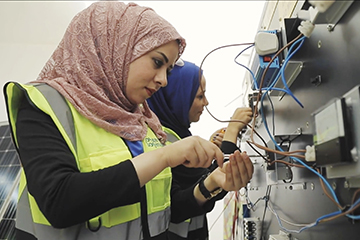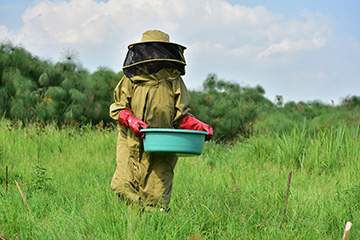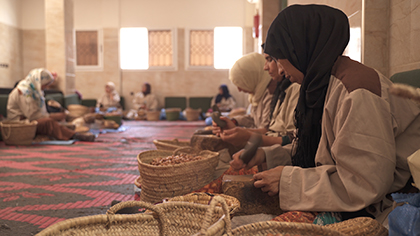Canada takes action to address the climate crisis around the world

Canadians woke up to the realities of the changing climate this past summer, with deadly heatwaves and record temperatures that brought wildfires, flash floods and drought across the country. The emergencies continued into the autumn in British Columbia, with record rainfalls that forced the evacuation of towns, collapsed highways and destroyed rail lines. Elsewhere in the world, there has been a rise in the number and severity of tropical storms, tornados and other extreme weather events that bring devastation.
Driven by ocean warming and dramatic shifts in longstanding environmental patterns, these conditions are creating an even greater awareness of the need to address the root causes of climate change and address its impact.

The SEED project is helping women work as technicians and “energy ambassadors” who educate their community on the importance of renewable energy. Photo: Cowater International.
Canada supports climate-action initiatives around the world, recognizing that global warming and biodiversity loss have no borders. Not only do these problems represent existential threats, they are catalysts for instability, conflict, starvation and pandemics. Indeed, the COVID-19 crisis has taught us that global problems require global solutions and that now, more than ever, we must come together to address such issues.
Developing countries, many of which have large rural populations, have been hit the hardest by climate change. The poorest and most vulnerable people in emerging markets have a limited capacity to address the consequences of severe weather, drought and flooding. And these countries critically require funding to support activities to help them transition to having low-carbon, climate-resilient economies. People are looking for ways to maintain and protect natural ecosystems that are safeguards against severe climate effects. They are turning to approaches that can also ensure they have access to sustenance and income.

Beekeeping helps communities benefit from restored wetlands and makes them more resilient to climate-change impacts. Photo: GoU/GCF/UNDP.
To assist developing countries, Canada committed $2.65 billion in funding for climate-finance investments in 2015, under a program that has supported 140 projects that are currently being implemented, or that were recently implemented, in Africa, Asia, Latin America, the Caribbean and the Middle East. These interventions are expected to help some 6 million people adapt to the effects of climate change and to help reduce 222 megatons of CO2-equivalent emissions, equal to taking 47 million cars off the road for 1 year.
Canada is now committed to ensuring that 2021 is a transformative year for ambitious global climate action that reaches the places where it’s needed the most. Our country has doubled its previous international climate-finance contribution to $5.3 billion in funding over the next 5 years to help countries transition to climate-resilient, nature-positive and inclusive sustainable development. Canada will also increase its grant contributions for climate financing up to a total of 40%, from the previous level of 30%.
The following are examples of climate-change mitigation and adaptation efforts supported by Global Affairs Canada that are making a difference and providing models for climate action around the world:
- In Jordan, a project is improving the awareness and adoption of renewable energy and energy efficiency. The initiative is helping households install solar-water heaters and panels and supporting schools and health centres in adopting renewable energy systems and improving their energy efficiency. It is also changing gender and social norms, providing employment and income opportunities and boosting skills and knowledge among women.
- A solar power plant in Vietnam has been created right at a hydro-generating station, where it “floats” on the dam’s reservoir—space that would not have been otherwise used. As well, a gender-action plan is an important feature of the project. For example, women were offered employment opportunities in the plant’s construction and are employed in its operation. As well, the project includes health and education programs for women and girls.

In central Vietnam, the Da Nhim-Ham Thuan-Da Mi solar power plant generates electricity during the daylight hours. Photo: Asian Development Bank.
- In Morocco, unique argan forests that were once under threat from deforestation are today suffering from thermal stress due to climate change. There is now a program focused on planting and preserving the country’s argan orchards. It supports rural communities by fostering argan-oil cooperatives that are primarily run by and employ women, providing them with sustainable incomes and improving their social standing.
- A program in Uganda supports agricultural cooperatives that are restoring and bringing new economic opportunities to the country’s wetlands. These valuable natural features are drying up as a result of climate change and are also drained for agriculture. Today, people there are learning the benefits of restoring water levels, regenerating the natural vegetation and finding alternative sources of income like beekeeping, poultry-raising and fish-farming.

The argan oil industry employs over 20,000 people, many of them women. Photo: Green Climate Fund
Initiatives such as these are helping developing countries build domestic capacity, protect biodiversity and adopt clean energy. Many of the projects tap the natural power of ecosystems to counter climate change, creating a virtuous circle that can enhance climate resilience. They also improve lives and livelihoods, especially for women and girls, transforming these communities and presenting models for others.
- Date modified: